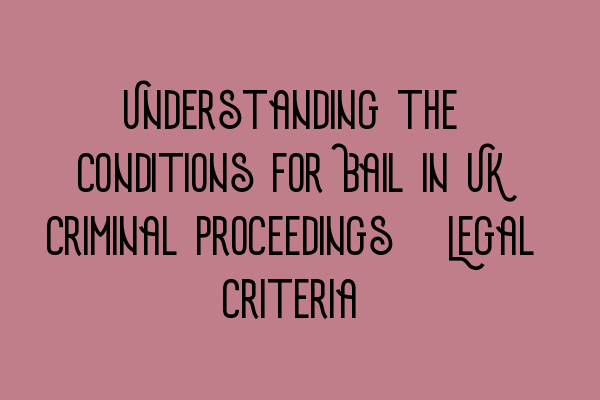Understanding the Conditions for Bail in UK Criminal Proceedings: Legal Criteria
When facing criminal charges in the UK, one of the crucial aspects of the legal process is the decision of whether you will be granted bail or remanded in custody until your trial. Bail is the temporary release of an accused person, based on certain conditions, with the aim of ensuring their attendance at court.
In this comprehensive guide, we will delve into the legal criteria and conditions for bail in UK criminal proceedings. Understanding these criteria is essential for anyone involved in the criminal justice system, from defendants to legal professionals.
The Legal Criteria for Granting Bail
Under the UK legal system, judges and magistrates are tasked with determining whether an accused person should be granted bail. The decision is based on several factors, which include but are not limited to the following:
- Risk of absconding: One of the primary concerns when granting bail is whether the accused poses a flight risk. The court will assess factors such as the accused’s ties to the community, previous criminal record, history of failing to appear in court, and the severity of the charges they face. It is crucial to demonstrate that you have strong ties to the community and are unlikely to flee.
- Risk of reoffending: Another key consideration is whether the accused is likely to commit further offenses if granted bail. The court will assess the nature of the alleged crime, any previous convictions, and other relevant factors. Providing evidence of rehabilitation efforts or engaging in support programs can help strengthen your case.
- Protection of the public: The court will also consider the potential risks the accused may pose to the public if they were to be released on bail. This factor is especially significant in cases involving violent crimes or offenses against vulnerable individuals. It is vital to address any concerns the court may have regarding potential harm to society.
- Availability of evidence and witnesses: The strength of the prosecution’s case, including the availability of evidence and witnesses, can have an impact on the decision to grant bail. If there is doubt about the strength of the case against you or if you can demonstrate that the witnesses are unreliable, it may increase the chances of being granted bail.
It is important to note that the decision to grant bail is not automatic, and the court will carefully consider the specific circumstances of each case. Engaging an experienced criminal defense solicitor can significantly improve your chances of obtaining bail.
Conditions for Bail
If the court determines that the accused is eligible for bail, certain conditions will be imposed to ensure compliance and mitigate potential risks. These conditions may include:
- Residential requirements: The court may require the accused to reside at a specific address, which could be their home or a specified location. Any change of address must be approved by the court.
- Curfew: The court may impose a curfew, requiring the accused to remain at their specified residence between certain hours.
- Surrendering travel documents: If there is a flight risk, the court may require the accused to surrender their passport or travel documents and impose travel restrictions.
- Regular reporting to a police station: The accused may be required to report regularly to a designated police station to ensure their compliance with bail conditions.
- Prohibition on contacting certain individuals: The court may impose restrictions on contacting specific individuals, especially if they are witnesses or co-defendants.
- Prohibition on engaging in certain activities: In some cases, the court may prohibit the accused from participating in specific activities, such as consuming alcohol or visiting certain places.
- Surety: The court may require the accused to provide a financial guarantee, known as a surety, to ensure their compliance with bail conditions. This can involve a sum of money or other assets.
It is essential to fully understand the conditions for bail imposed by the court and strictly adhere to them. Failure to comply with bail conditions can result in arrest and the revocation of bail.
Conclusion
Obtaining bail in UK criminal proceedings is a complex process that requires a comprehensive understanding of the legal criteria and conditions. By demonstrating strong ties to the community, rehabilitation efforts, and addressing any concerns regarding potential risks, your chances of being granted bail can be significantly improved.
For expert legal advice and representation in criminal proceedings, contact SQE Criminal Law & Practice Law UK. Our team of experienced solicitors can guide you through the bail application process, ensuring the best possible outcome in your case.
Related Articles:
